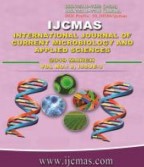


 National Academy of Agricultural Sciences (NAAS)
National Academy of Agricultural Sciences (NAAS)

|
PRINT ISSN : 2319-7692
Online ISSN : 2319-7706 Issues : 12 per year Publisher : Excellent Publishers Email : editorijcmas@gmail.com / submit@ijcmas.com Editor-in-chief: Dr.M.Prakash Index Copernicus ICV 2018: 95.39 NAAS RATING 2020: 5.38 |
Agricultural production is mainly depends on the health of soil, which is a measure of a complex set of biological, chemical and physical interactions driven by microorganisms. Effective microorganism increases the beneficial microbial population in the soil for sustainable crop production. Effective Microorganisms are mixed cultures of beneficial naturally-occurring organisms that can be applied as inoculants to increase the microbial diversity of soil ecosystem. They consist mainly of the photosynthesizing bacteria, lactic acid bacteria, yeasts, actinomycetes and fermenting fungi. EM will improve the structure of the soil, increase its fertility and radically improve biological diversity, suppress soil-borne pathogens, fixes the nitrogen in soil and enhances nutrient uptake, accelerates the decomposition of organic waste, residues and composting, increases beneficial minerals in organic compound, enhances the activities of indigenous microorganism and boosts the strength of plants and yield of crops. EM works by being dominant over other soil microbes. As a result, this encourages the bulk of the other microbes in the soil to follow them and in doing so suppress the activity of the smaller group of negative or opportunistic microbes. Effective microorganisms can help to improve and maintain the soil chemical and physical properties.
 |
 |
 |
 |
 |